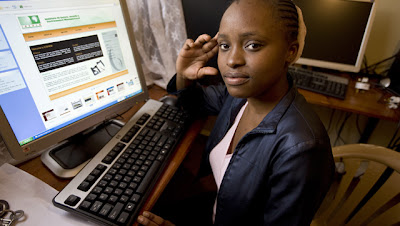As part of the Wikiprogress on Gender Equality series, this progblog article is bought to you by Angela Hariche and Karen Barnes Robinson.
They graduated together five years ago, and took a job in
the same firm in the same city. Three years later, he can afford a down payment
on a house and she cannot.
Her day starts with fetching water and firewood and cleaning
the compound. Once she has taken care of the needs of the men and children, she
leaves for the marketplace to sell vegetables.
She has three young children. Finding it difficult to make
ends meet, she is caring for her elderly neighbour on an hourly basis, while
working a part-time job as a maid in a local hotel. Neither job comes with
healthcare benefits.
These women are not victims. They are agents of change who
bring resources, knowledge and capacity to their households, communities and
societies. Without these women, the world would be worse off. Yet, they are
still not being recognised, paid or valued for the work they do, and society as
a whole suffers. Why is it this way? For much of the past two decades, the
global economy has experienced a period of significant growth and overall rates
of poverty have declined. However, inequalities between men and women, between
rich and poor and between urban and rural communities remain rife. Why are
women, in particular, not benefiting from global progress?
First, women are not being recognised. They are undervalued.
In 2009, the European Commission launched a campaign to address the fact that
on average, women earn 17.4% less than men. In the US, research has shown that
one year after college, women earn only 80% of what their male colleagues earn.
Why aren’t enough women being represented on boards or in politics? Can any of
our current measures for economic performance address this issue? There are indicators
that measure the percentage of women in senior positions over time but if a country’s success was based on it, you
can bet leaders would work a little harder to appoint women in top positions.
If this indicator was important and recognised, imagine what might change.
Second, women are not being counted. They are invisible. Women
are 50 percent of the population yet up until now, a lot of the work they do
isn’t being considered in current measures of economic resources. What would it
mean if all of the work that women do around the world was actually counted and
measured over time? Recent research from the UN Research Institute for Social
Development argues that if unpaid care work, mostly done by women, was assigned
a monetary value, it would amount to between 10 to 39 per cent of GDP. Clearly
there is a powerful economic argument for beginning to value women’s work.
Unless this work is acknowledged in economic data, then policies will fail to
target and support women and their contributions to the global economy will
remain invisible. Once we are able to see the work they are doing, we can start
counting it. What if there was an indicator called the household work indicator
and it too was just as recognized as GDP?
Third, women are not able to access the same opportunities
as men. They are marginalised. Globalisation and development processes have
transformed men and women’s roles and relations, but this has not necessarily
translated into more access to resources and greater empowerment for women or
more gender equality. More women end up in the informal sector in ‘bad jobs’,
and as recent research by the OECD Development Centre has shown, there is a
‘feminisation of bad jobs’, where discrimination against women leads to them
being stuck in jobs with poor working conditions and low or no pay. This has
major implications for the health and welfare of their households and their own
economic and physical security. Little or no income means that women are also
not saving or driving consumption and economic growth. What if there was an
indicator called the well-being indicator and it was a measure of economic
health of a society and it was fully recognised and supported like the mighty GDP?
We are now in 2013. The world has changed since 1930s when
GDP was created. While we recgonise that GDP is a good measure of
production, we call for equally powerful indicators that incorporate a broader
range of factors including informal work. If these existed, we might see a
difference in the world. Can we have sustainable economic growth and global
progress when not only are there more women in worse jobs, but they are also
consistently paid less for the work that they do or not paid at all? It is a
question of supporting women’s rights and gender equality, but it is also a
question of supporting smart economics by making sure that measures for
progress in societies take women into account. There is considerable work being
done on this at the OECD
and around the world. However, unleashing the economic and social potential of women and making them visible in government policy is a major global challenge, one that would reap
significant economic benefits if really
and truly supported. This would
be revolutionary. In the end, it comes down to the fact that what doesn’t count
isn’t counted, and we only count what we can see. We have to start seeing women
and the work they do.
By Angela Costrini
Hariche and Karen Barnes Robinson


